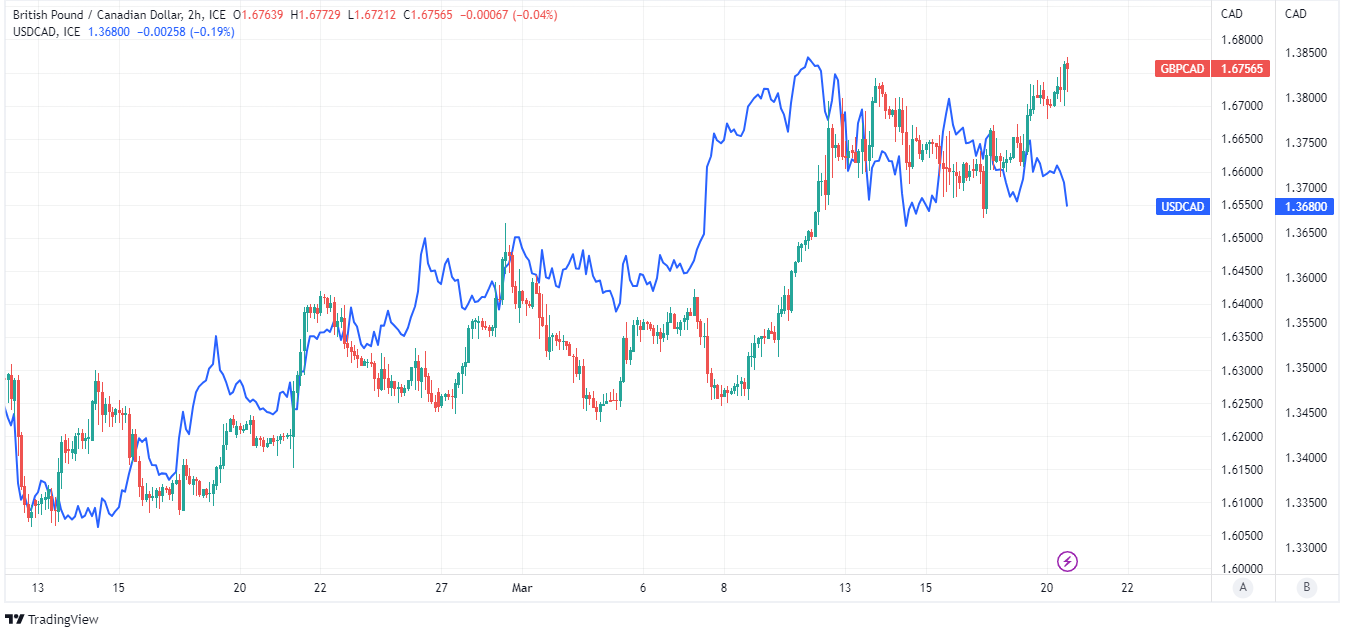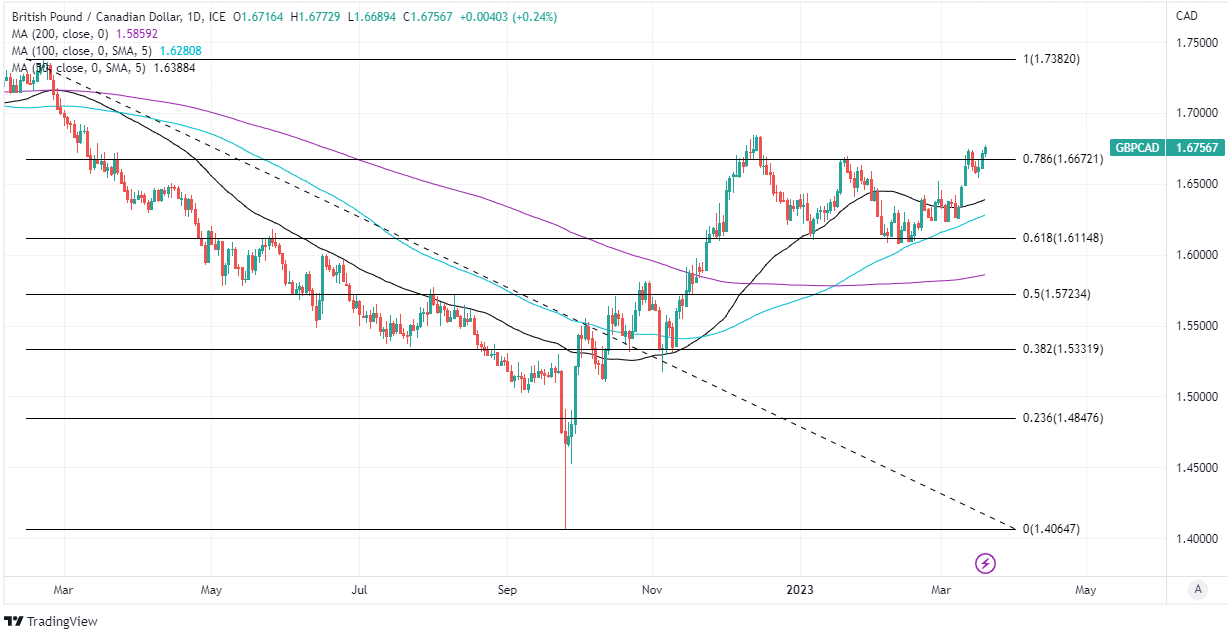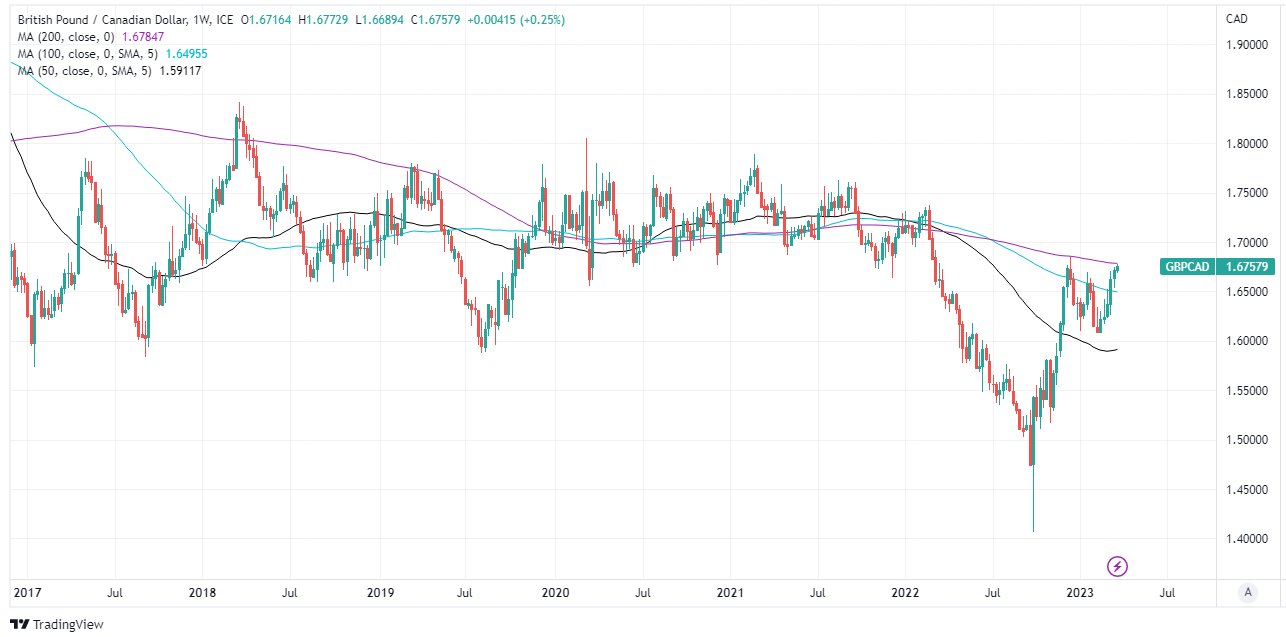GBP/CAD: Breaking Higher on Charts
- Written by: James Skinner
- GBP/CAD breaking above key resistance at 1.6672 on chart
- Bringing December high at 1.6833 into contention short-term
- UK & CA inflation in focus going into close-call BoE decision
- Market eyes steady rates; any increase could llift GBP/CAD

Image © Adobe Stock
The Pound to Canadian Dollar exchange rate has eroded an important technical resistance on the charts to reach three-month highs early in the new week but could rise further up ahead if the Bank of England (BoE) surprises market expectations by lifting Bank Rate again on Thursday.
Canada's Dollar was a relative outperfomer of most major currencies in Monday trade but with Sterling and the Swedish Krona faring better while leading GBP/CAD to reach its highest since mid-December after overcoming an important level of technical resistance on the charts last week.
GBP/CAD eroded and eventually closed above the 78.6% Fibonacci retracement of its 2022 downtrend located at 1.6672 last week, bringing its December high of 1.6837 into contention for the days ahead when inflation data and the latest BoE decision will help determine the outlook for Sterling.
"We have long looked for a 4.25% rate peak, current terminal rates currently stand at 4.11%. An additional complication for the BoE, beyond bank-related concerns, comes via February CPI being released on the eve of the BoE decision," says Jeremy Stretch, head of FX strategy at CIBC Capital Markets.
"Should we see a shock downside surprise to February CPI, big base effects are set to be witnessed in March and April, the prospect of the BoE feeling throttling back and waiting for the May meeting, and updated macro forecasts will advance," Stretch writes in Monday market commentary.
 Above: Pound to Canadian Dollar rate shown at 2-hour intervals alongside USD/CAD.Click image for closer inspection.
Above: Pound to Canadian Dollar rate shown at 2-hour intervals alongside USD/CAD.Click image for closer inspection.
Compare GBP to CAD Exchange Rates
Find out how much you could save on your pound to Canadian dollar transfer
Potential saving vs high street banks:
C$4,450.00
Free • No obligation • Takes 2 minutes
The consensus suggests UK inflation fell from 10.1% to 9.9% last month and that the core inflation rate dipped from 5.7% to 5.6% while economists are still looking on average for an increase in Bank Rate to 4.25% on Thursday.
However, market-implied measures of expectations suggest investors no longer anticipate an increase in Bank Rate this week after adjusting their expectations lower in the wake of this month's bank failures in the U.S. and Europe, which means Sterling could benefit notably from any increase if one is delivered.
"BMO Economics expects this week's data to show a further fall in headline inflation during the month of February," writes Stephen Gallo, a global FX strategist at BMO Capital Markets, in Monday market commentary.
"I think bigger than expected declines in inflation, if they emerge, are a good thing for the CAD — but the FX market probably won't agree until energy prices rebound," Gallo adds.
Thursday's BoE decision and the Wednesday release of inflation numbers are preceded on Tuesday by Canada's publication of its own prices data, which could impact expectations for the Bank of Canada (BoC) cash rate if there is a notable interruption of the recent trend of moderating price pressures.
Above: Financial model-derived estimates of probable trading ranges for selected currency pairs this week. Source Pound Sterling Live. (If you are looking to protect or boost your international payment budget you could consider securing today's rate for use in the future, or set an order for your ideal rate when it is achieved, more information can be found here.)
"The bar to higher rates in Canada remains high, the more so following the volatility in bank stocks over the past week, and it is unlikely that the Feb data will move the needle for policymakers here for now. However, persistently sticky prices may raise doubts about whether the Bank’s policy hold can endure," says Shaun Osborne, chief FX strategist at Scotiabank.
"US-Canada yield spreads across the curve and weaker (i.e., CAD-negative) commodity prices and terms of trade are reflecting near meaningless correlations with the CAD now. Even the CAD’s relatively high correlation with stocks is bordering on the statistically insignificant (just under 60% for the rolling 1m study). The lack of a clear theme driving the currency is perhaps fueling investor indifference in to CAD," he adds in a Friday research briefing.
The economist consensus sees inflation as likely to have moderated from 5.9% to 5.4% in Canada during February with the more important core inflation rate also seen falling from 5% to 4.8% in an outcome that would do nothing to discourage the BoC from keeping its cash rate unchanged at 4.5%.
The BoC said in February that it would hold interest rates at current levels while observing whether last year's increases are having the desired effect of bringing inflation back to 2% target, although the Canadian Dollar would potentially benefit from anything that leads financial markets to anticipate further increases.
"Before the recent turbulence on the financial markets, the market was still expecting the BoC to add a small amount to its rate hikes in the course of the year, and rate cuts were not expected until 2024, in line with the Fed. In the wake of jittery markets, (global) interest rate hike expectations dropped, with the result that the BoC is now expected to cut rates as early as this year," says Elisabeth Andreae, an FX analyst at Commerzbank.
 Above: Pound to Canadian Dollar rate shown at daily intervals with selected moving averages and Fibonacci retracements of 2022 downtrend indicating possible areas of technical resistance for Sterling. Click image for closer inspection. To optimise the timing of international payments you could consider setting a free FX rate alert here.
Above: Pound to Canadian Dollar rate shown at daily intervals with selected moving averages and Fibonacci retracements of 2022 downtrend indicating possible areas of technical resistance for Sterling. Click image for closer inspection. To optimise the timing of international payments you could consider setting a free FX rate alert here.
Wednesday's UK inflation figures will be more important to the Bank of England due to other UK data recently emerging better than many economists expected, and following last week's national budget.
The budget led the Debt Management Office (DMO) to estimate a public borrowing requirement of £241.1BN in total for the 2023-24 year; higher than the £234.1 billion estimated estimated following the September 'mini budget.'
"Despite encouraging signs that inflationary pressures are easing, we think the Bank of England will probably opt for one final 25bp hike on Thursday if it can, though that's undoubtedly contingent on what happens in financial markets. Remember that the BoE has set a much lower bar for pausing hikes than the likes of the Fed and ECB," says James Smith, an economist at ING.
"In short, the meeting is on a knife edge and to a large extent it will come down to whether stability in financial markets starts to return. A calmer financial market backdrop would keep a 25bp hike on the table. Further volatility could easily see a ‘no change’ decision, with non-committal guidance that further hikes could be enacted if the situation changes," Smith writes in a Monday research briefing.
 Above: Pound to Canadian Dollar rate shown at weekly intervals. Click image for closer inspection.
Above: Pound to Canadian Dollar rate shown at weekly intervals. Click image for closer inspection.
Compare GBP to CAD Exchange Rates
Find out how much you could save on your pound to Canadian dollar transfer
Potential saving vs high street banks:
C$4,450.00
Free • No obligation • Takes 2 minutes





